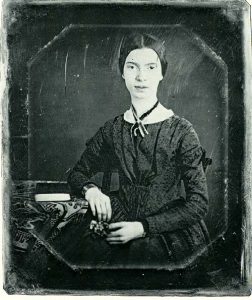 With spring in the air, I thought the following poem from Emily Dickinson might help us mark the welcome change of seasons. However, Dickinson also provides a cautionary note. The spectacular inspires us, but it also slips by. Spring not only arrives but also departs. Our resulting sense of loss is like “Trade” encroaching “upon a Sacrament.”
With spring in the air, I thought the following poem from Emily Dickinson might help us mark the welcome change of seasons. However, Dickinson also provides a cautionary note. The spectacular inspires us, but it also slips by. Spring not only arrives but also departs. Our resulting sense of loss is like “Trade” encroaching “upon a Sacrament.”
A Light Exists in Spring
Emily Dickinson (1830-86)
A light exists in spring
Not present on the year
At any other period.
When March is scarcely here
A color stands abroad
On solitary hills
That science cannot overtake,
But human naturefeels.
It waits upon the lawn;
It shows the furthest tree
Upon the furthest slope we know;
It almost speaks to me.
Then, as horizons step,
Or noons report away,
Without the formula of sound,
It passes, and we stay:
A quality of loss
Affecting our content,
As trade had suddenly encroached
Upon a sacrament.

Thank you for sharing this beautiful poem. That makes me think of T.S. Eliot’s The Waste Land, with the line about “April is the cruellest month.” In Wisconsin, I think March is crueller, so I’m grateful to be on to April soon. I can already see the snowdrops and crocuses that my husband planted last fall emerging in our garden.
April is the cruellest month, breeding
Lilacs out of the dead land, mixing
Memory and desire, stirring
Dull roots with spring rain.
Winter kept us warm, covering
Earth in forgetful snow, feeding
A little life with dried tubers.
Poetic reflections on Spring are surely common in the Anglo-American canon. The poets are often concerned not only with Spring itself but also with hope, the human spirit, and/or an elusive god. I’m struck by how often the tone is melancholic. Here’s D.H. Lawrence speaking in “The Enkindled Spring”:
The spring as it comes bursts up in bonfires green,
Wild puffing of emerald trees, and flame-filled bushes,
Thorn-blossom lifting in wreaths or smoke between
Where the wood fumes up and the watery, flickering rushes.
I am amazed at this spring, this conflagration
Of green fires lit on the soil of the earth, this blaze
Of growing, and sparks that puff in wild gyration,
Faces of people steaming across my gaze.
And I, what fountain of fire am I among
This leaping combustion of spring? My spirit is tossed
About like a shadow buffeted in the throng
Of flames, a shadow that’s gone astray, and is lost.
I agree–the spring poems Do often have a melancholic tone. I think it might be because early spring is frequently intertwined with winter: on days like today, when we have unexpected snow, we are reminded that winter will come around again soon enough.
Emily Dickinson and Robert Frost both lived in the pretty town of Amherst, in western Massachusetts. Dickinson was born and raised and Amherst, and Frost taught at Amherst College.
Here are two poems by Robert Frost about spring.
“Spring Pools”
These pools that, though in forests, still reflect
The total sky almost without defect,
And like the flowers beside them, chill and shiver,
Will like the flowers beside them soon be gone,
And yet not out by any brook or river,
But up by roots to bring dark foliage on.
The trees that have it in their pent-up buds
To darken nature and be summer woods –
Let them think twice before they use their powers
To blot out and drink up and sweep away
These flowery waters and these watery flowers
From snow that melted only yesterday.
“A Prayer in Spring”
Oh, give us pleasure in the flowers to-day;
And give us not to think so far away
As the uncertain harvest; keep us here
All simply in the springing of the year.
Oh, give us pleasure in the orchard white,
Like nothing else by day, like ghosts by night;
And make us happy in the happy bees,
The swarm dilating round the perfect trees.
And make us happy in the darting bird
That suddenly above the bees is heard,
The meteor that thrusts in with needle bill,
And off a blossom in mid air stands still.
For this is love and nothing else is love,
The which it is reserved for God above
To sanctify to what far ends He will,
But which it only needs that we fulfil.
Robert Frost